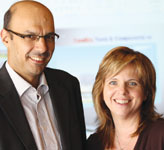
The Hydrogen South Africa (HySA) Catalysis Centre, part of government’s flagship programme in hydrogen and fuel cell technologies, has developed what it hopes will serve as the launching pad for the ambitious goal of capturing 25% of the global fuel cell and hydrogen catalyst market by 2020.
The project is based in a smart new building at the top of the University of Cape Town’s (UCT) upper campus.
Key advantage in potentially huge market

Fuel cells provide environmentally clean and extremely reliable power that can be used in many ways. For example, they are currently being implemented in the automotive industry by Toyota and Hyundai to produce commercial vehicles, although the cost for these models is still quite high. Other applications that are currently being researched include providing power and backup power for the telecoms industry, for instance for cellphone service providers.
The market for fuel cell technology is small at the moment because there is not a lot of demand for it, according to Dr Olaf Conrad, director of the HySA Catalysis Centre of Competence, co-hosted by the UCT faculty of engineering and the built environment and Mintek, the national R&D organisation for mineral processing.
Conrad believes that demand creation for the technology will be driven by awareness and knowledge sharing of this potentially ground-breaking renewable energy technology. Globally, countries are already preparing their industries for fuel cell technology changeovers, creating markets and encouraging demand, and South Africa could become a significant supplier to these industries.
“When the fuel cell technology industry takes off, it is going to be a multibillion dollar market,” he says. “Currently we are in the gold rush phase where everyone with a pick-axe thinks they will find gold. As a technologist I am really excited about this technology. It is because of its beauty – and its simplicity is its beauty. You take a fuel that has a huge amount of energy and convert it directly into electricity. You save a lot of steps and prevent many losses.”
While many countries and academic programmes have their eyes on capitalising on this market, South Africa has a decisive advantage: a vital component of fuel cell technology is platinum and SA controls an estimated 80% share of global platinum group metal (PGM) reserves.
“South Africa needs to get into the market at the same time as the US, European Union, Korea, Japan, etc. and that is what we want to tap into. When those markets develop, they will shop around internationally for the best price and we need to be competitive at this stage otherwise they will look elsewhere,” says Dr Conrad.
That is why the SA government launched a 15-year plan in 2008 to research, establish and commercially develop fuel cell technology for South Africa. “In a nutshell, rather than replicating academic research demonstrators for the umpteenth time, we focus on meeting immediate catalyst needs in the global fuel cell industry, and to support South African companies in their bid to penetrate the global fuel cell component and manufacturing market with their own products and services,” says the centre’s Sharon Blair. She leads ‘Key Programme 2 on Portable Power’, tasked with providing the centre with a commercial focus to give direction to the technical programme.
I show you the product, you show me the money
At the end of the first five years, the centre has not only met its goal of catching up to international standards in terms of understanding and establishing the technology academically, but it has also developed a fuel cell product, the Pt/C catalyst HySA-V40, that is available pre-commercially. This product has various applications and is currently being marketed as a reliable and cost-effective catalyst for various industries.
“We have the product, now we need to get it into the hands of actual customers, to engage with foreign technology companies and provide them with support while they in return get a foothold in South Africa. So it is a mutually beneficial relationship that will see our catalyst becoming a major part in their future product,” says Dr Conrad. “It all boils down to the bottom line, which is what convinces technology companies to look to fuel cells as their future technology.”
Although setting up a fuel cell system may be expensive initially, maintenance of the system is basic and much cheaper than the maintenance of current systems and backup plans that may run on diesel or less reliable wind or solar power. Fuel cells could be also used to provide electricity to areas not currently serviced by grid power, to power field hospitals and provide Internet to far-off locations.
But having the product is not enough. Being able to innovate and improve on the product as the technology matures is vital as this will be an important issue to future partners. Working out scalable models of the technology is also important, so research is still an important part of the centre’s strategy.
There is also not much research on the effects of using less platinum in fuel cell products to reduce costs but without losing too much reliability, and this aspect is being looked at quite closely by the HySa centre as it could have a massive impact on future applications.
It is estimated that fuel cell technology will take over especially the automotive industry in future. South Africa at present has a large traditional car manufacturing industry, with thousands of people working on assembling traditional car parts. When this industry becomes obsolete, the HySa centre wants to see fuel cell technology established to such an extent in South Africa, that it is able to drive new job creation and wealth generation for a new generation.

© Technews Publishing (Pty) Ltd | All Rights Reserved